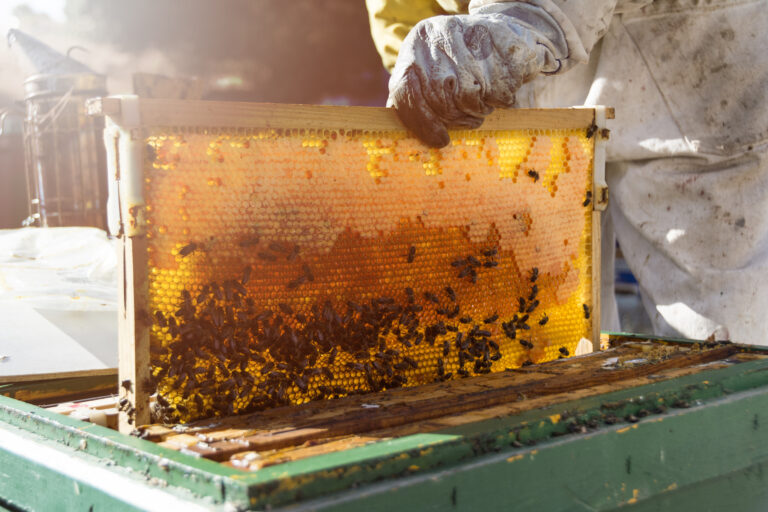
The captivating process of extracting nature’s golden nectar from the fragile honeycomb cells nestled inside the humming hive is known as honey extraction, a time-honored art form that has captivated nations for years. A delicate dance between tradition and innovation, and the hive’s buzzing expectancy of harvest, all contribute to the rich and complex tale of honey from hive to table.
In the center of Uganda, as it is in much of Africa, honey extraction is more than simply a profession; it is a cultural legacy interwoven with everyday routines. In this place, beekeeping thrives as a tribute to persistence and ingenuity among the lush surroundings and active populations. It incorporates traditional wisdom that has been passed down by agriculture’s unwavering quest of advancement.
The first murmurs of honey being ready for harvest fill the hive when the hardworking bees seal their precious creations with a layer of beeswax, a sign that the liquid gold inside has reached its final state of perfection. When the time comes to extract honey, an expert beekeeper can determine this by looking at the weight of the hives and this natural indicator. But in a ballet as old as time, a myriad of factors influence nature’s timing, from the whims of the climate to the quirks of the local bee species to the rich tapestry of floral sources
On the day of extraction, beekeepers suit up in protective bee jackets and arm themselves with indispensable yet ageless tools in preparation for their delicate work. As smokers are lit, a soft buzz of anticipation rises through the hive, lulling the hardworking occupants and getting them ready for the bounty that lies ahead. It’s a custom as old as beekeeping itself, a tasteful fusion of history and usefulness.
Now that a veil of calm has settled over the hive, the procedure proceeds with painstaking accuracy. Carefully removed, frames covered with the shimmering honeycomb are revealed, each cell full of liquid ambrosia. Honey supers are those towering storehouses of nature’s gift. This moment of wonder and devotion is a tribute to the bees’ unceasing labor and the beekeeper’s leadership.
The delicate process of uncapping, which involves uncovering the hidden treasure within, is similar to how beekeepers skillfully remove the thin layer of beeswax that covers the honey-filled cells. The objective is always the same, whether you use a heated knife and the deft touch of tradition or the modern, sleek efficiency of uncapping forks: to respectfully and reverently unlock the hive’s treasure.
Finally, the moment of great expectation is here: extraction. Centrifugal extractors are used to separate honey from combs with remarkable efficiency. They operate in a symphony of motion, with frames packed with honeycomb inside. On the other hand, some beekeepers prefer to stick with the tried-and-true techniques, letting gravity and time do the heavy lifting as honey flows into eagerly awaiting vessels, ready to be enjoyed by hungry mouths.
However, the adventure is far from over. Beekeepers carefully remove any remaining impurities from the freshly extracted honey during a last refinement, making sure that every drop is a tribute to quality and purity. The chance to taste the honey straight from the comb, in its most natural state, is a timeless delight for those who like a more hands-on experience and a connection to nature’s bounty in its purest form.
Honey extraction is a brilliant illustration of the harmonious coexistence of tradition and innovation in the vast field of agriculture. It’s evidence of the tenacity of African beekeepers, who skillfully ride the waves of change while paying tribute to the ageless knowledge of their forefathers. The knowledge and experience required to maintain this delicate balance are easily accessible through platforms like Youth Platform Africa, guaranteeing that the tradition of honey extraction will flourish for many generations to come. Therefore, let us raise our jars in honor of the common honeybee and the beekeepers who care for their hives, for in their work lies a sweetness that is born of tradition, creativity, and the everlasting cycles of nature. A sweetness that surpasses mere taste.
Expert: Mr. Bees Africa
